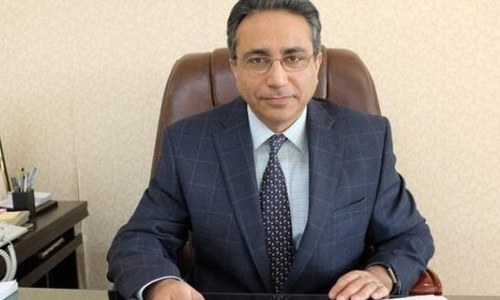ISLAMABAD: The federal government on Friday reiterated that people of Pakistan — not any particular province — have the first right of use over natural gas as they are its ultimate owners.
In a written rejoinder to the Sindh chief minister’s assertions that the province was being deprived of its due share of gas, the ministry of energy (petroleum division) insisted that “citizens of Pakistan (not any particular province) have the first right of use given that citizens are ultimate owners of this resource”.
It said this interpretation of Article 158 of the Constitution, as viewed by the petroleum division, was also presented at a meeting of the Council of Common Interests (CCI) held on Dec 23, 2019.
Article 158 reads: “The province in which the well-head of natural gas is situated shall have precedence over other parts of Pakistan in meeting the requirements of natural gas from that well head, subject to the commitments and obligations as on the commencing day.”
Petroleum division issues rejoinder to CM’s letter
The petroleum division asserted that any use of gas beyond domestic consumers needed to be amicably decided between the federation and the provinces under Article-158. Special Assistant to the Prime Minister (SAPM) on Petroleum Nadeem Babar had also stated in his press briefing earlier this week that the “government also maintains uniform procurement and release policies on all items like petrol, electricity, water and wheat”, it added.
In what appeared to be an attempt to coax the Sindh leadership into negotiations on weighted average cost of gas, the petroleum division said that it “has not rejected the Sindh Government’s demand that gas needs of the province should be fulfilled first nor such recommendation is under consideration”.
However, it claimed at the same time that during the CCI meeting on Dec 23, “both the SAPM and Sindh Chief Minister had agreed to categorise Liquefied Natural Gas (LNG) as (natural) gas and the subsequent jurisdiction of Oil & Gas Regulatory Authority (OGRA) to determine its price”.
Moreover, “they had also agreed to the SAPM’s visit to Karachi, subject to CM Sindh’s availability, to discuss the subject of Weighted Average Cost of Gas (WACOG), gas distribution and pricing through constructive discussions”.
The petroleum division’s rejoinder said that any gas discovered in Sindh had been allocated to the Sui Southern Gas Company Limited (SSGCL) during the present government’s tenure and the SAPM’s interpretation of Article-158 had been misconstrued.
It said that Sindh was currently producing approximately 2,243 million cubic feet per day (mmcfd) of gas and out of this 1200-1300 mmcfd was being put in SSGC system while approximately 700 mmcfd was provided directly to power and fertiliser sectors in that province. “After netting out gas supplied by SSGC in Balochistan, there remains 400-500 mmcfd of gas that goes out of Sindh,” the petroleum division said and yet again reiterated that “even if Sindh’s interpretation of Article 158 is applied, Sindh will be short of gas in two years”.
On the contrary, the federal government would wish to uphold the positive spirit of CCI meeting wherein it was mutually agreed to reach decisions on distribution of gas to Sindh in a collaborative manner, the petroleum division said, adding that it was “therefore, in the interest of Sindh and not just the Federation, to arrive at a mutually agreed structure for supplies, distribution & pricing of natural gas in any form to ensure uninterrupted supplies to the country”.
A day earlier, Sindh Chief Minister Murad Ali Shah had written a ‘protest letter’ to the prime minister over misreporting by the Centre that he had agreed during the CCI meeting to inclusion of LNG in the weighted average cost of gas formula of local natural gas.
In his letter, Mr Shah said that the Centre had time and again assured the Sindh government that import of RNLG would solely be for tier-II category of natural gas consumers under ring-fenced tariff arrangements and existing tier-I consumers of natural gas under WACOG-based tariff would not bear the burden of high cost of imported RLNG.
“Any Federal Government attempt to workout natural gas tariff by including RLNG into existing WACOG of indigenously produced natural gas is gravely disturbing, upsetting and illegal”, wrote Mr Shah and “categorically rejected any such unconstitutional and illegal proposal”.
The CM said Sindh was the largest producer of natural gas in the country and its consumers should not be burdened with the high cost of RLNG. For reference, he said that the notified price of RLNG for the month of December 2019 was $10.8349 or Rs1,690 per MMBTU against the WACOG of Rs520.54 per MMBTU for indigenous gas.
Mr Shah said that his province produced between 2500 and 2600mmcfd of natural gas and the quota of the SSGCL for its two franchised provinces i.e. Sindh & Balochistan varied between 1200-1300mmcfd. Sindh currently received on an average 900-1000 mmcfd of natural gas against its constitutional right of 2500-2600mmcfd, he said, adding that it defied even common sense that the people of Sindh were deprived of its constitutional share of 2600mmcfd at Rs520.54 per MMBTU and were being asked to buy it at Rs1,690 per MMBTU.
He said that making an analogy between wheat production in Punjab with oil and gas production was a ridiculous, incorrect, misleading and irresponsible claim. Also, he said, the distribution of natural gas was governed by Article 158 of the Constitution and it was analogous to grant of hydel profits to the provinces of Khyber Paktunkhwa and Punjab based on Article 161 (2).
Published in Dawn, January 11th, 2020













































